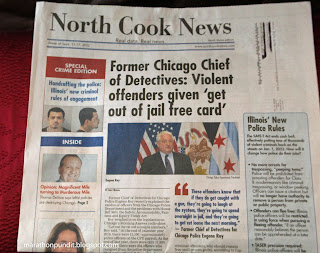In 2020, veteran journalist Matt Rosenberg, who was part of the Chicago Sun-Times' undercover team that exposed raw corruption in the 1970s when the paper opened
The Mirage bar, returned to his native city after two rounds of widespread rioting and looting. The first outbreak of criminality and mayhem occurred in late May of that year after the murder of George Floyd in Minneapolis. The second round took place in August, in response to a false social media rumor that Chicago Police shot dead an unarmed criminal suspect.
The riots got Matt pissed off for sure. What did he do? He not only returned to Chicago, but he spoke with people who provide him hope--most of them living in some of the city's most crime-ridden neighborhoods, places like Woodlawn, Roseland, and Englewood. The result is his book, What Next, Chicago? Notes of a Pissed-Off Native Son, which was published last year.
In it, Rosenberg provides context to how Chicago ended up in its current sad state.
The saying, "Success has a thousand fathers and failure none," is false. It's just that most people prefer not to dwell on failure. Rosenberg looks back at Chicago's sordid past and unhappy present. He doesn't say it, but it appears that Chicago got what it deserved.
In spirit, What Next, Chicago? is reminiscent of Once in a Great City: A Detroit Story, authored by David Maraniss, a native of the Motor City. Published in 2015, Maraniss zeroed in on the years 1962 through 1964, when Detroit seemed to be on the mend from the pain of the 1943 Race Riot. Sure, there were some storm clouds on the horizon, such as middle-class residents fleeing to the suburbs, blatantly racist cops, and out-of-date automobile plants. But Detroit appeared to be on the cusp of scoring the 1968 Summer Olympics, it had a reform mayor, Jerome Cavanagh, who openly welcomed Martin Luther King when he marched there, the Ford Mustang was introduced, and the Motor City, thanks to Motown, was an admired cultural hub.
We know how that story ends. The 1967 Riot, the worst urban unrest since the 1863 Conscription Riots, followed by the Big Three automakers' inability to adapt to foreign competition, and then massive depopulation, forced Detroit to file bankruptcy in 2013.
But Maraniss, a liberal, missed another big reason for the decline of Detroit. In 1963, Cavanagh signed into law a municipal income tax and a commuter tax, which remain in place. His Republican predecessor vetoed those bills. It's been a few years since I read it, but I recall that Maraniss mentioned those toxic taxes just twice in his book. Some people can't break out of their ideological prison. Not so Rosenberg.
And Matt has the advantage of reporting on fresh events. And that's not the only reason Rosenberg's is the better book. And in regard to municipal finance, he brings Chicago's fiscal millstone--the unfunded municipal public worker pension crisis--into the discussion. It's part of the offspring of Chicago's long history of graft and dishonest government. It was first perfected--I'm not sure if that is the right word--by Irish pols. But Chicago corruption is now a multi-racial endeavor. Oh, by the way, I am of Irish descent.
Back to those pensions: Public sector union were rewarded decades ago by Chicago mayors--only they didn't bother to pay for these generous retirements. The bill is due and the financial pain, barring pension reform, which Rosenberg favors, will only get worse.
Chicago Public Schools don't educate, the system churns out students with few marketable skills. Rosenberg provides examples of charter schools bucking the trend of failure--but then he explains how the Chicago Teachers Union vehemently opposes them. So much for "being for the kids."
The Chicago Police Department aren't heroes in this story either. Rosenberg cites a cop who "[b]elieves about 5 percent of his fellow Chicago cops are the dregs of the profession and another 5 percent are rock stars. The remaining 90 percent are decent but not exceptional performers, he says."
Clear villains here include Chicago's bombastic but incompetent mayor, Lori Lightfoot, whose response to criticism is to accuse her opponents of "systemic racism." Even in regard to COVID-19. Kim Foxx, the Cook County state's attorney, is another villain. It's her job it is to prosecute criminals. She acts more like a soft-hearted social worker.
Rosenberg takes Chicago's race-hustlers, besides Lightfoot, to task, and that includes woke whites.
So, what's next, Chicago? The author manages to find reason for optimism by walking the streets of Chicago's disadvantaged neighborhoods. Rosenberg meets with "the Rooftop Pastor," Corey Brooks. Through the non-profit arm of Brooks' church, the pastor provides job-training, parenting classes, and financial education. And Rosenberg speaks with the Voker Brothers, Varney and Varmah, ex-cons and former gang members who run their own logistics and transportation business, as well as Javier Carranza, who helps run a family-owned coffee shop. If Chicago is to enjoy a better future, it will be because of people like them. Chicago's politicians, as a group, are irredeemable. Alderman Ray Lopez of the 15th Ward is a notable exception.
Rosenberg mentions the many Chicago "public servants" who have been convicted of corruption. For every crook nabbed, there are ten others who get away their crimes.
Near the end of What Next, Chicago?--he lists a litany of Chicago's ills--all of them-human caused.
On the next to last page of his book, Rosenberg offers the words of Darryl Smith on Englewood, whose 14-year-old daughter was killed in a shooting--she was not the intended target.
My Chicago friends, it's up to you.
"You have to want it. No white guy's gonna give you nuthin'," Smith says. "No Black guy's gonna give you nuthin'. That's just a fact."
What Next, Chicago? Notes of a Pissed-Off Native Son is available at Amazon.





